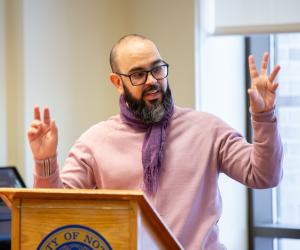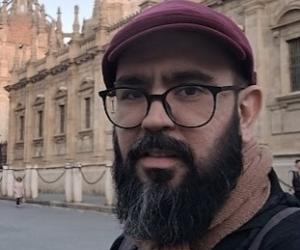Eduardo Febres is a Ph.D. candidate in the Spanish program of the University of Notre Dame. He received his M.A. in Journalism from Universidad Torcuato Di Tella in Argentina (2011) and his B.A. in Literature from Universidad Central de Venezuela (2006). From 2012 to 2018, he was part of the workers-owned cooperative, Mecha, in Caracas, Venezuela, participating in educational and transmedia projects to facilitate low-income youth access to critical thought and visual communication tools. Febres’ current research focuses on the confluence and synchronicity of two phenomena that marked the beginning of the 19th Century in Latin America: the independence revolution against the Spanish empire and exponential growth in the number of printing presses installed in Hispanic America. He analyzes how some of the pioneering editors and revolutionaries, headed by Simón Bolívar, postulated singular notions of art, race, identity, and dialogue with the West in their printed projects that challenge or question some of the fundamental assumptions of the late 19th Century and 20th Century Latin Americanism. He is affiliated to the Environmental Humanities Initiative, the Initiative for Race and Resilience, and the Kellogg Institute. He coordinates the website Afro-Latin American Writers in Translation (http://alawit.org), and he is the editor of the street art book Alerta que salpica:paredes pintadas de América Latina, published by Ocho Libros in Chile, 2017. He is a Kellogg Dissertation Year Fellow for 2024-25.








